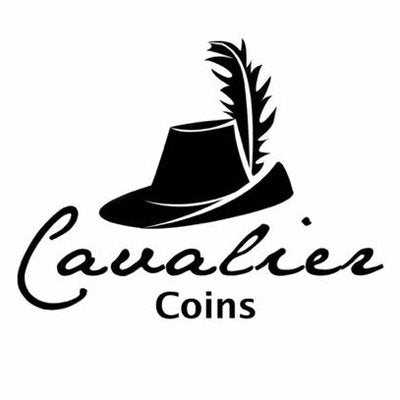So, you've come across a collection of old coins. Maybe you inherited them, or perhaps you found them tucked away in the attic. The big question now is: where's the best place to sell them and get a fair price?
In the UK, you've really got three main routes to go down. You could take them to a specialist coin dealer for a quick and straightforward sale. For the really rare or high-value pieces, an auction house might be your best bet. And then there’s the option of selling them yourself through an online marketplace, which opens you up to a global audience. Each path has its own pros and cons, and the right one for you really depends on what you're selling and what you want to achieve.
Your Guide on Where to Sell Antique Coins in the UK
Figuring out where to sell your antique coins can feel a bit daunting at first, but it all boils down to a classic balancing act between three things: the price you'll get, how quickly you can sell, and the fees you'll have to pay.
Think of it this way: a specialist dealer is like a 'we buy any car' service. They offer expertise and immediate payment, but they need to buy at a price that leaves them room for profit. So, you'll get a fair price, but it won't be top-of-the-market retail.
An auction house, on the other hand, is the place for those showstopper coins. By putting your prize pieces in front of a room full of eager collectors, you create a competitive bidding environment that can drive the price way up. It’s the perfect stage for the truly exceptional stuff.
Then you have online marketplaces. This route puts you firmly in the driver's seat, letting you connect directly with buyers from all over the world. It requires a bit more effort, but you have full control over the process.
This image gives a handy breakdown of the typical seller fees you can expect from each option.
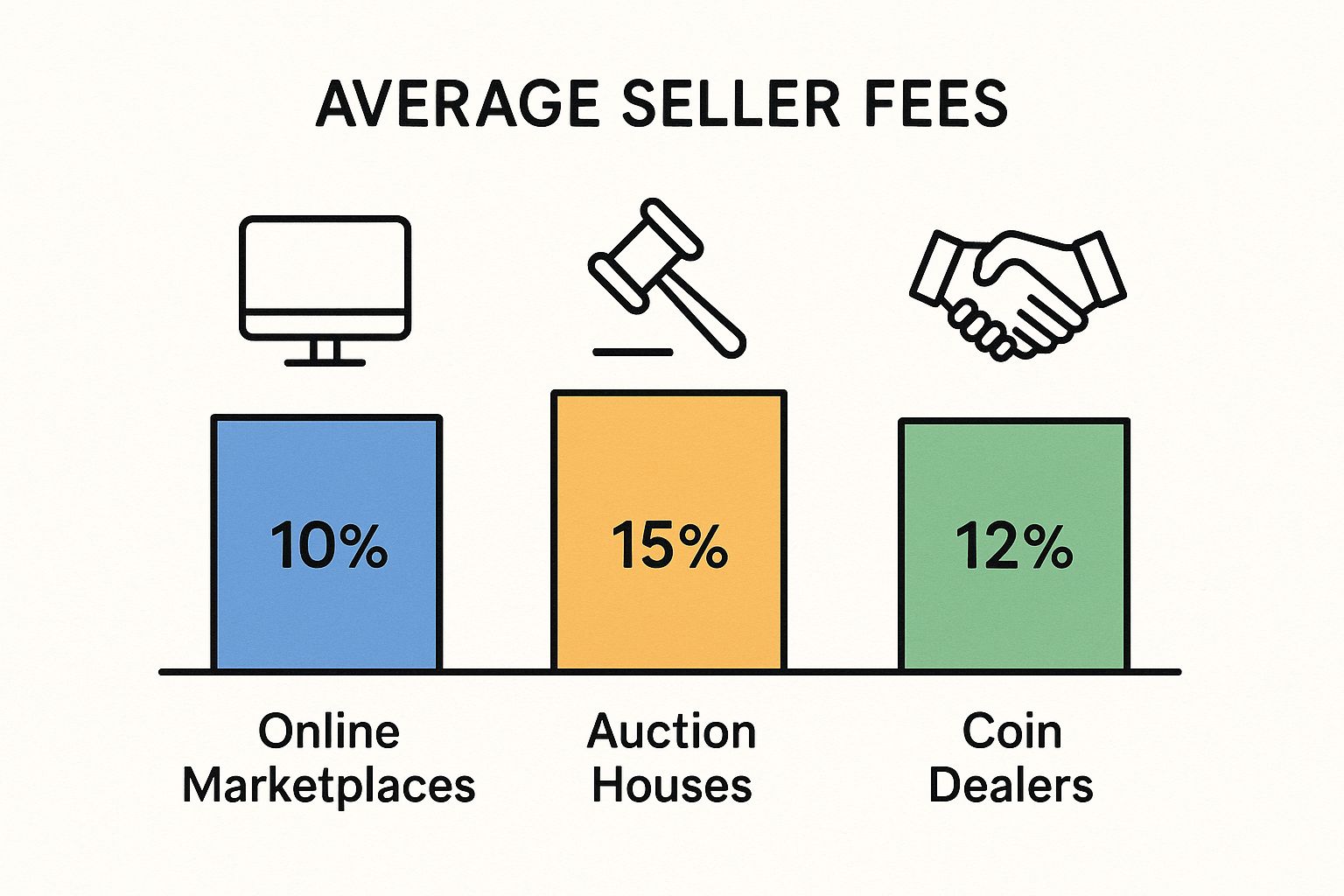
As you can see, online platforms often have the lowest fees, while auction houses tend to charge the most. That higher commission reflects the premium service, expert curation, and access to serious, high-spending collectors they bring to the table.
To help you weigh your options, here’s a quick side-by-side look at the main venues.
Comparing UK Coin Selling Venues
| Selling Venue | Best For | Potential Price | Sale Speed | Associated Fees |
|---|---|---|---|---|
| Specialist Dealer | Quick, secure sales & professional valuations | Moderate | Fast (Immediate) | Low (Factored into offer) |
| Auction House | Rare, high-value, and sought-after coins | High | Slow (Weeks/Months) | High (15-25%+) |
| Online Marketplace | Common to mid-range coins & direct seller control | Variable | Variable | Low (5-15%) |
Ultimately, the best choice really hangs on what you have and what your priorities are. A dealer offers speed, an auction house offers the highest potential price for top-tier coins, and online platforms offer control and lower fees.
Understanding the UK Coin Market
The British coin market is a fascinating mix of old and new. The traditional, trusted ways of doing things are still going strong, but there’s no denying the growing influence of the digital world.
Recent industry figures show that the old guard—auction houses, specialist dealers, and coin fairs—still handle the lion's share, accounting for nearly 65% of antique coin sales in the UK. But online platforms are catching up fast, now making up a significant 35% of all transactions. This shift towards digital is a clear trend, and you can learn more about the evolving British coin market to see how it might shape your selling strategy.
Key Takeaway: There's no single "best" place to sell coins. The trick is to match your coins, and your own priorities—whether that’s a quick sale, the highest possible price, or just convenience—to the right channel.
How to Prepare Your Coins for a Successful Sale
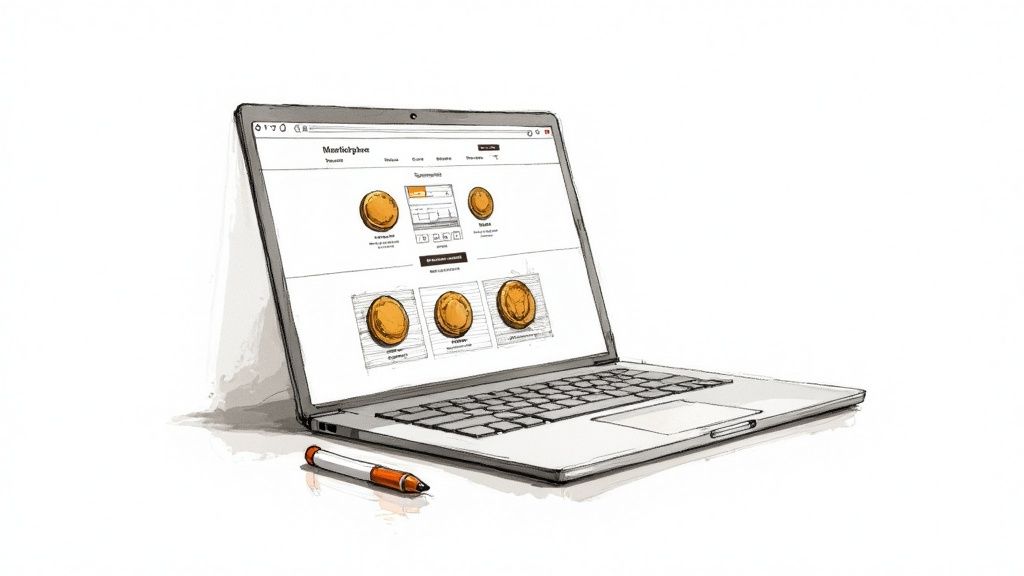
Before you even start thinking about where to sell your antique coins, taking a step back to prepare them is the single most important thing you can do to unlock their real value. Honestly, rushing to a buyer without knowing exactly what you've got is a bit like trying to sell a house without knowing its address. You’re almost certain to leave a lot of money on the table.
Now, if there's one golden rule in the world of coin collecting, it’s this: do not clean your coins. It's a completely natural urge to want to make them look shiny and new, but it's a spectacularly costly mistake.
Think of the natural toning, or patina, on an old coin like the original finish on a piece of antique furniture. Scrubbing it away is the equivalent of stripping that historic varnish right off. In an instant, you destroy a huge chunk of its character, its history, and most importantly, its value to any serious collector. Even the gentlest cleaning can leave microscopic scratches that a professional will spot from a mile off, and that will slash your potential return.
Get a Professional Valuation
So, instead of reaching for the polish, your very first move should be to get a professional opinion on your coin's true worth. This is a world away from simply walking into a shop and asking, "what will you give me for this?" A proper valuation gives you a detailed breakdown of your coin's grade, its authenticity, and its fair market value.
This step is absolutely crucial because the coin market can be surprisingly complex. A coin's value isn't just about its age or how much silver or gold it contains. Things like rarity, its specific condition (what we call 'grading'), and its historical significance play a much, much bigger role.
An expert appraisal is your most powerful tool. It transforms you from a hopeful seller into an informed one, giving you the knowledge and confidence to negotiate a fair price, no matter where you decide to sell.
Why Certification Matters
For any coins that might be particularly valuable, getting them professionally graded and certified by a reputable organisation is a total game-changer. Here in the UK, bodies like the British Numismatic Trade Association (BNTA) are the gold standard for expertise and trust. When a coin has been certified, or 'slabbed', it comes sealed in a case with a guarantee of its authenticity and a specific grade, which removes any doubt for a potential buyer.
It’s this professional backing that allows a coin to fetch top prices at auction or from a discerning dealer. It's the difference between selling an unverified story and selling a documented piece of history.
The rare coin market in the UK has seen some incredible price growth, particularly for specimens with low mintages or interesting minting errors. Just think of the 1999 one-penny coin with a rare double-strike error, which became a sensation in British numismatics. It’s a perfect example of how a tiny, specific quirk can catapult a coin's value into a completely different league. If you're curious about how minting mistakes can create huge value, you can explore more insights on this remarkable coin's journey.
Selling Directly to Specialist Coin Dealers
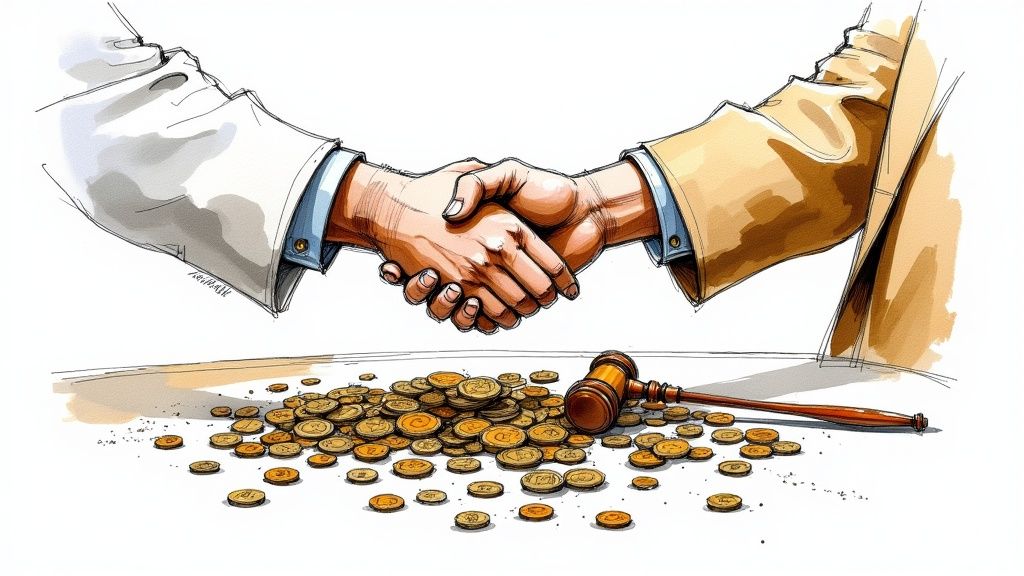
For a lot of people, the most straightforward path from holding a coin to having cash in hand is going through a specialist dealer. This route is ideal if you value speed, security, and sheer convenience over squeezing every last penny out of a sale, which is more the territory of a drawn-out auction.
Think of a coin dealer as a professional buyer who is always in the market for good-quality stock. Their entire business is built on buying coins at a fair wholesale price, which allows them to then sell them on to collectors at a profit. Because of this, their offer will naturally sit below the coin’s full retail value.
But what you get in return for that small margin is massive: an immediate, stress-free transaction with a genuine expert. There are no listing fees, no agonising wait for bidders, and no uncertainty. You get a professional valuation and a cash offer, often on the very same day.
Finding a Reputable Dealer
The absolute key to a good sale is finding a dealer you can trust. Let's be honest, not all dealers are created equal, and your best protection is to work with those who are members of established professional organisations.
Here in the UK, the gold standard is the British Numismatic Trade Association (BNTA). If a dealer is a BNTA member, it’s a powerful sign that they’re committed to high ethical standards and have deep expertise. It’s your assurance that you’re dealing with a vetted professional who is held accountable for their business practices.
Expert Insight: Choosing a BNTA member gives you a valuable safety net. These dealers must adhere to a strict code of conduct, which protects you from lowball offers and ensures your coins are assessed accurately for authenticity and grade.
Once you’ve found a dealer you like the look of, the process is usually very simple. A quick phone call or email is the best way to start – sending over some clear photos of your coins will be a huge help. From there, they’ll talk you through the next steps, which will likely involve popping in for an in-person appointment for the final valuation and offer.
For a more detailed look at the journey, our complete guide on how to sell coins in the UK has plenty of extra tips to make sure it all goes smoothly.
The Negotiation Process
When you get an offer, don't feel shy about asking questions. A proper dealer will be more than happy to explain exactly how they arrived at their valuation. They'll talk you through the coin's condition, its rarity, and what the current market demand looks like.
While their initial offer will likely be firm, understanding the logic behind it helps you feel confident you're getting a fair price. It’s this kind of transparent, professional approach that makes selling to a dealer perfect for anyone looking for a quick and secure sale.
Navigating the World of UK Coin Auctions
If you’ve got a genuinely rare or high-value coin in your possession, an auction house is the ultimate stage. Think of it less like a straightforward shop sale and more like a competitive arena. Here, passionate collectors bid against one another, often pushing the final price well beyond what anyone first expected. This is why it’s the go-to choice for exceptional pieces that truly deserve the spotlight.
The journey starts with finding the right partner. Not all auction houses are created equal; some are masters of ancient Roman coins, while others have a stellar reputation for modern British rarities. It’s absolutely crucial to research houses with a proven track record for coins like yours. A great place to start is by looking at the top players, and our guide on the best online coin auctions can point you towards the leading names in the UK.
Once you’ve picked a house, you’ll move on to the consignment process, which is the formal agreement to let them sell your coin on your behalf.
The Consignment and Cataloguing Process
This is where an auction house’s expertise really comes into its own. After you consign your coin, their numismatic specialists get to work. They’ll meticulously research it, take professional photographs, and craft a compelling description for the auction catalogue. This catalogue is more than just a list; it’s a powerful marketing tool sent out to a curated global audience of serious collectors and investors, building a buzz long before the hammer falls.
This professional presentation makes all the difference. A well-catalogued coin, complete with its historical story and crisp, high-quality images, will always grab more attention and attract higher bids. It elevates your item from a simple piece of metal to a documented artefact with a rich past.
Key Insight: An auction house doesn't just sell your coin; it markets it. They build a narrative around your piece, leveraging their reputation and client base to create a competitive bidding environment that you simply cannot replicate on your own.
Understanding the Costs and Commissions
Of course, this premium service has its costs, and it’s important to understand them from the outset. The main charge is the seller's commission, sometimes called the 'hammer fee'. This is simply a percentage of the final sale price.
But there can be other charges to factor in.
- Lotting Fee: A small, flat fee for each item or group of items (a 'lot').
- Photography Charges: For the professional images used in the catalogue and online.
- Insurance: A fee to protect your coin while it’s in the auction house's care.
In total, these fees usually land somewhere between 15% to 25% of the final sale price. It’s best to view this not as a cost, but as an investment in achieving the absolute maximum return. For a truly special coin, the final hammer price nearly always outweighs these fees by a significant margin.
Here’s a quick look at how the fees might break down for a high-value piece.
Auction House Fee Structure Example
This table shows a potential cost breakdown for selling a valuable coin through a major UK auction house.
| Fee Type | Typical Percentage/Cost | Description |
|---|---|---|
| Seller's Commission | 15% of Hammer Price | The primary fee charged by the auction house for the sale. |
| Lotting Fee | £20 per Lot | A flat administrative fee for cataloguing and listing the item. |
| Photography Fee | £50 | Covers professional, high-resolution imaging for marketing materials. |
| Insurance Fee | 1.5% of Hammer Price | Covers the coin against loss or damage while in their possession. |
| VAT (on fees) | 20% of Total Fees | Value Added Tax is applied to the auction house's service fees. |
As you can see, the costs are transparent and directly tied to the service you receive. For that one-of-a-kind coin, the expertise and marketing reach an auction house provides is often well worth it.
The UK's market for antique and ancient coins has seen an incredible resurgence lately. It's part of a global trend where collectors increasingly see coins as tangible, valuable assets. The market is now worth billions, with pieces like Roman denarii and Greek drachmas hitting premium prices, especially when they have professional grading and solid provenance. You can discover more about the thriving ancient coin market here to get a feel for current trends.
Using Online Marketplaces to Sell Your Coins
The internet has basically thrown open the doors to a global auction room, putting collectors from all over the world right at your fingertips. For anyone happy to roll up their sleeves and take a more hands-on approach, online marketplaces like eBay or even specialist numismatic forums can be a brilliant platform. This route puts you squarely in the driver's seat for the entire sale.
Unlike taking your coins to a dealer or an auction house, you’re the one setting the price, writing the description, and sorting out the postage. Yes, it’s a bit more work, but the trade-off is often much lower fees – typically somewhere between 5% to 15%. Plus, you get to connect directly with the person who will actually end up treasuring your coin. It's the perfect choice if you want maximum control over the whole process.
Crafting a Listing That Sells
Your success on a marketplace really boils down to one thing: the quality of your listing. Think of it as your digital shop window. To draw in serious buyers, it needs to be attractive, packed with information, and, most importantly, trustworthy.
The two things that make or break a listing are the photos and the description. Vague, blurry pictures are an instant red flag for any seasoned collector. Instead, take several high-resolution photos of your coin against a plain, neutral background. Make sure you capture both the obverse (the 'heads' side) and the reverse (the 'tails' side), along with clear shots of the edges and any dings, marks, or unique features.
Your description needs to be just as thorough and, above all, completely honest.
- Be Specific: Always include the coin’s year, its denomination, where it’s from, and any history you know about it.
- Describe the Condition: Be upfront about any scratches, wear, or toning you can see. Honesty builds trust and stops any potential arguments down the line.
- Use Keywords: Think like a collector. Use terms they would search for, like "Roman denarius" or "Victorian silver crown," to make sure your listing pops up in their searches.
An honest and detailed listing does more than just sell a coin; it builds your reputation as a trustworthy seller. This is crucial for attracting repeat buyers and achieving better prices in the future.
Ensuring a Safe and Secure Transaction
While online marketplaces offer huge potential, you do need to have your wits about you to make sure every transaction is a safe one. Protecting both yourself and the buyer is key to a successful sale where everyone walks away happy.
First off, stick to secure payment methods. Platforms like PayPal have solid seller protection policies that can shield you from fraudulent claims. A golden rule is to always, always wait until the payment is fully confirmed and has cleared in your account before you even think about posting the coin.
Shipping is the final, crucial step. You should never send a valuable coin through standard post. Always use a tracked and fully insured service, like Royal Mail Special Delivery Guaranteed. This doesn't just protect you financially if the package goes missing; it also gives the buyer proof of postage and some much-needed peace of mind. And don't forget to package the coin properly in a padded envelope or a small box – the last thing you want is for it to get damaged on its journey.
Common and Costly Mistakes to Avoid
Navigating the world of antique coins is incredibly rewarding, but a few simple missteps can turn a potential windfall into a costly disappointment. Knowing where to sell your antique coins is only half the battle; knowing what not to do is just as crucial.
The single biggest mistake we see? Improper cleaning. It’s a natural instinct, wanting to polish up a tarnished old coin to make it shine. But doing so strips away its historical character and can absolutely tank its value. Think of it like sanding down a beautiful antique table; you’re literally removing the very essence of its age and story.
Setting Unrealistic Expectations
Another frequent pitfall is getting your price expectations wrong. It’s easy to browse online listings and see sky-high asking prices, but these are often just wishful thinking, not a true reflection of what coins actually sell for. The real market value is set by completed sales, not ambitious listings.
Key Takeaway: A coin's real value is what a collector has recently paid for a similar piece, not the price a seller is hoping to achieve. Always research actual auction results or consult a trusted dealer for a dose of reality.
To get this right, you need a solid grasp of how to value coins based on real-world data. Our expert guide on how to value old coins for collectors is a great starting point, with practical tips for understanding the factors that determine a coin's genuine market price.
Other Costly Errors to Sidestep
Beyond cleaning and pricing, a few other mistakes can trip up even the most careful of sellers. By being aware of them, you can protect your coins and make sure you get a fair deal.
- Falling for Unsolicited Offers: Be very wary of unexpected messages from strangers offering to buy your collection. These are almost never in your best interest and are often attempts to snap up your coins for far less than they're actually worth.
- Grading Common Coins: Professional grading is essential for rare, high-value coins, but it simply isn't cost-effective for more common pieces. The grading fee can easily be more than the coin’s value, meaning you’ll end up losing money on the process.
- Ignoring Provenance: If you have any old receipts, letters, or family stories related to your coins, keep them safe! This history, or provenance, can add significant value and is a huge draw for serious buyers.
A Few Common Questions About Selling Coins
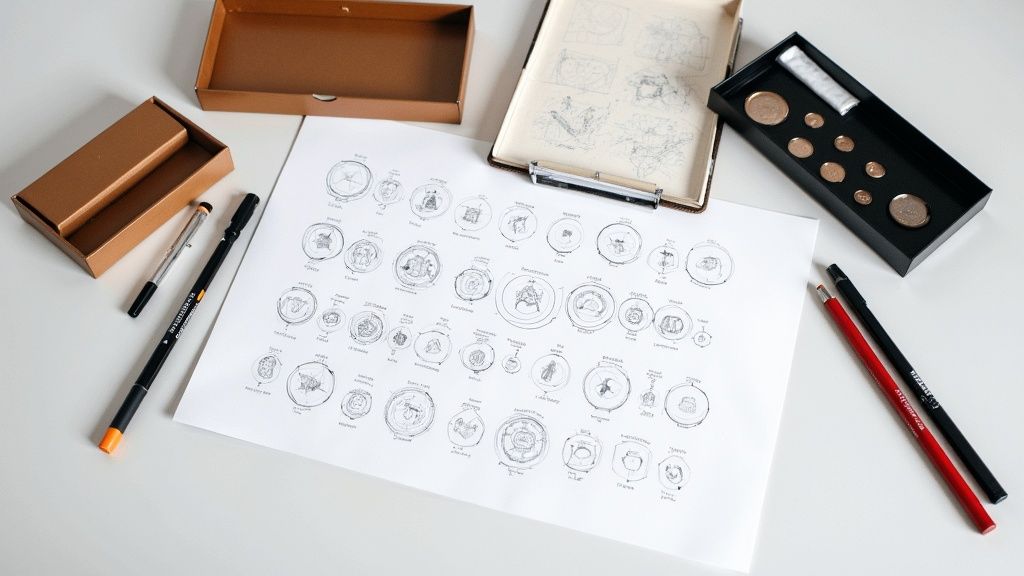
Stepping into the world of numismatics can bring up a lot of questions, especially when it's time to sell. If you're wondering about the best way to part with your antique coins, you're not alone. Here are some straightforward answers to the queries we hear most often from sellers in the UK.
How Can I Get My Antique Coins Valued for Free in the UK?
Most reputable coin dealers and auction houses are more than happy to offer a free initial valuation with no strings attached. You can usually kick things off by sending some clear photos of your coins through their website, or you can book an appointment to see them in person.
Think of this first look as a way to see if your coins have enough potential value to warrant a deeper, more formal appraisal. Be very cautious of anyone who wants to charge a fee just for a quick opinion on your collection.
Should I Sell My Coin Collection as a Whole or Individually?
This is a classic question, and the honest answer is: it depends entirely on what’s in your collection.
If you’ve put together a curated set of genuinely rare, high-value coins, selling them one by one at auction will almost certainly bring you the best return. This way, each special piece gets its own moment in the spotlight.
On the other hand, if your collection is made up of more common coins with just one or two standouts, a dealer might make a fair offer for the whole lot. That approach can save you a huge amount of time and effort. The only way to know for sure is to get a professional valuation to help you decide on the right strategy.
A quick note on tax: here in the UK, some coins like gold Sovereigns are actually exempt from Capital Gains Tax (CGT). However, most other antique coins fall under the category of 'chattels'. This means you could be liable for tax on any profit from a single coin sold for over £6,000. It's always a good idea to chat with a financial advisor for specific guidance.
At Cavalier Coins Ltd, we're here to offer expert advice and fair, honest appraisals to help you uncover the true value of your collection. Whether you're a long-time collector or have recently inherited some coins, we can guide you through the entire selling process. To learn more, explore our services at https://www.cavaliercoins.com.
